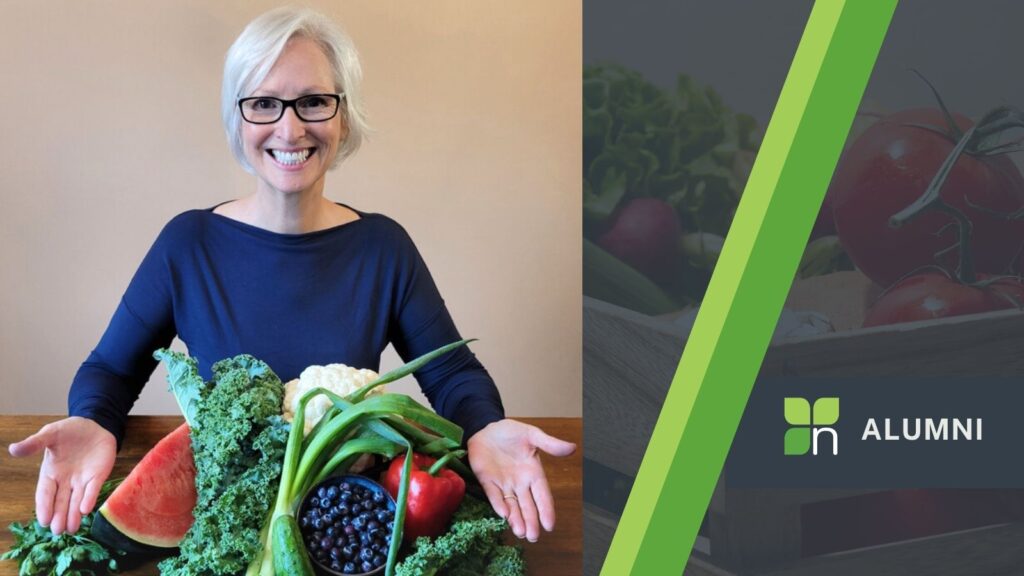NUNM Alumni | Research into ‘food as medicine’ prompts a career shift to education.

When Katherine Ferruzzi stepped away from her career to raise her children, she didn’t anticipate the next chapter would lead her deep into the science of nutrition—or set her on a new path to help others improve their heart health.
Ferruzzi had worked as an environmental chemist with the U.S. Army Corps of Engineers, but over time, her curiosity about the connection between diet, lifestyle, and well-being became difficult to ignore.
Initially enrolling in the Master of Science in Nutrition program at NUNM to deepen her understanding of nutrition, she soon discovered a passion for using food as a tool to prevent and manage disease.
During her Clinical Nutrition studies, Ferruzzi developed a strong interest in cardiovascular health. She was particularly drawn to the idea that food could be a stand-alone intervention—not just a supplement to medication—for managing cholesterol.
That insight ultimately reshaped her professional goals.
Since graduating from NUNM in 2024, Ferruzzi has established herself as a nutritionist, educator, and lifestyle coach. Today, she leads a four-week course focused on natural, evidence-based strategies for lowering cholesterol through nutrition.
—
Katherine Ferruzzi recently spoke with NUNM about her journey into Clinical Nutrition and how evidence-based research inspired her career goals.
NUNM: What motivated you to study Clinical Nutrition?
Ferruzzi: Honestly, I wasn’t planning to use this degree for work, but rather for my own knowledge. I’ve always enjoyed biochemistry, and the more I read about nutrition, I realized that my chemistry degree helped me understand nutrition on a deeper level. However, it also created more questions for me.
I went back to school in an effort to organize my understanding of the nutrition field. My education at NUNM answered many of these questions, as well as piqued my interest in how certain nutrients can alter and change the course of disease.
What sparked your interest in cholesterol and heart disease?
Heart disease wasn’t on my radar at first, but my curiosity was sparked once I reviewed the healthcare data, learning just how many Americans are affected each year and how it is the leading cause of death in the U.S.
This pushed me to further explore nutritional science and physiology. For example, which nutritional changes are necessary to reduce cholesterol, versus what happens when no dietary changes are made, and an individual takes medication?
Can you share more about the focus and findings of your case study?
At NUNM, I was encouraged to research literature on lipids and their role in heart disease and how diet can alter cholesterol levels, reducing the risk of health complications from atherosclerosis. This led to my study, “Case Report: Effects of Diet on Hypercholesterolemia”, published in the Journal of Restorative Medicine in 2024.
The research focused on a patient who reduced their LDL cholesterol by 50 percent in just six months, with the aid of dietary changes (e.g., increased consumption of plant-based foods, reduced intake of red meat and eggs, and the addition of fish and nuts) as well as regular exercise.
How did this experience influence your career path?
It completely redirected my path. My research project organically exposed the idea of teaching. It led me to create a course, “Lower Cholesterol Naturally”, which I now teach at the West Linn Adult Community Center and Portland Community College as a Community Education Course.
It’s rewarding to support students in achieving their goals of lowering their cholesterol and reducing their risk for heart disease using nutrition and lifestyle.
What lessons have you learned from working in Clinical Nutrition?
The science of nutrition can be complicated, and research teaches how to ask questions that can produce in-depth answers. Nutrition research establishes nutrition as a science, connecting diet to human disease and health, and altering our understanding of human behavior around food and its role in different cultures.
As a Nutritionist, I need to be able to convey this information in a much simpler form. Clinical Nutrition gave me the tools to work one-on-one with people to help shift their habits and better understand the connection between diet and disease. It also helped me develop clearer ways to communicate that knowledge.
What advice would you give to someone considering a career in Nutrition?
There are many different directions you can take in the field of Nutrition, like clinical, community outreach, sports nutrition, and culinary—and some of these can overlap.
Explore what interests you, as this will help give you direction when choosing a career. Know your strengths and weaknesses. This will determine what skills you need to advance your career.
Written by Ashley Villarreal, NUNM Marketing Content Specialist